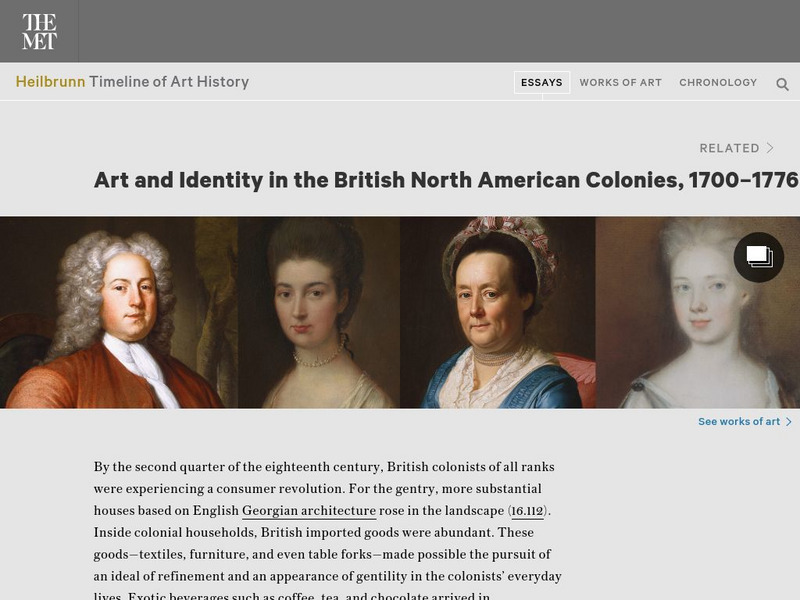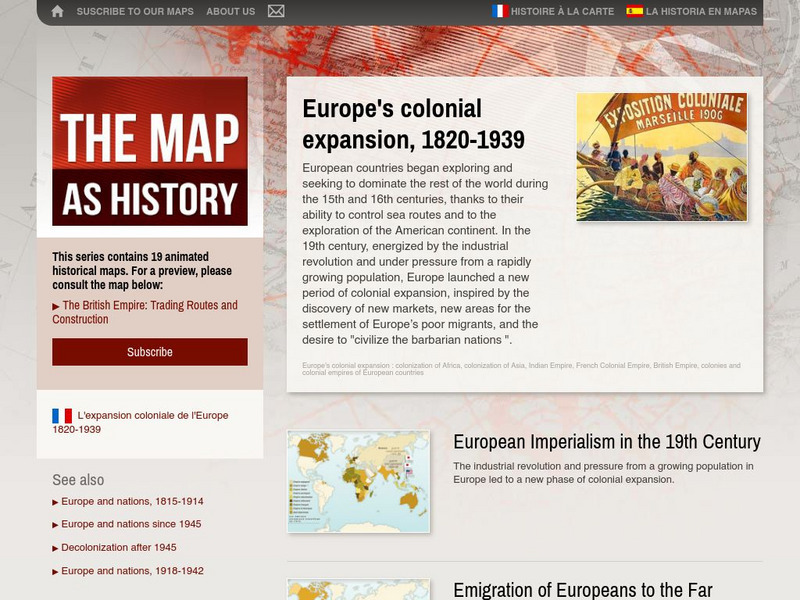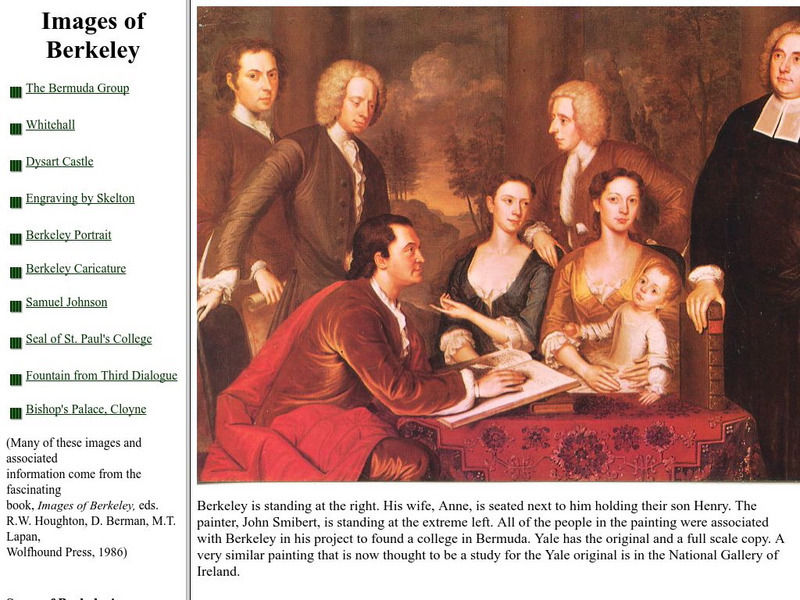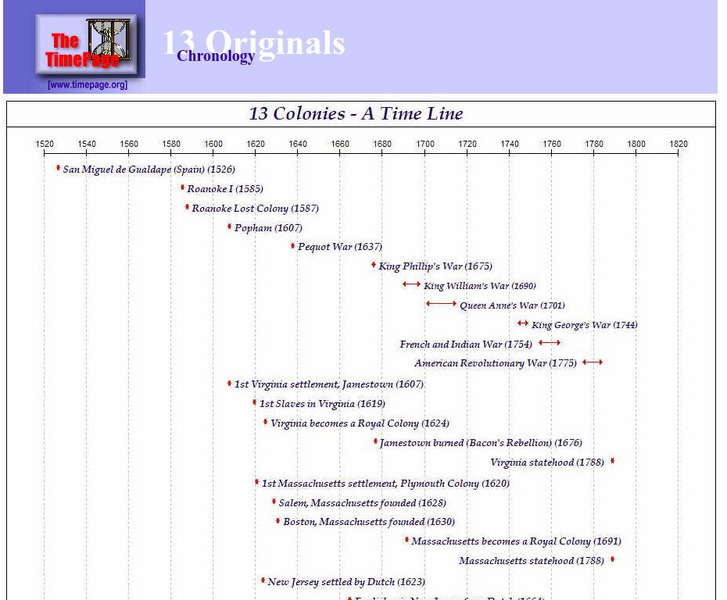Metropolitan Museum of Art
Metropolitan Museum of Art: Art and Identity in British North American Colonies
Consider the English identity of American colonists by examining the sorts of imported goods and decorative arts Americans chose to purchase and display.
Smithsonian Institution
Smithsonian American Art Museum: Young America in Art
An historical site from the Smithsonian American Art Museum that shows the growth of America through art work by over 45 artists. This site by the Smithsonian Institute has fascinating images showing American artists depicting the...
Tom Richey
Tom richey.net: Native American Cultures 1491 1607 [Ppt]
Presents key ideas for examining the cultures of Native American tribes that lived in North America in early colonial times. Discusses the major groups, the way of life of each group, and where they lived.
Metropolitan Museum of Art
Metropolitan Museum of Art: Coffee, Tea, and Chocolate in Early Colonial America
Several examples of pots for coffee, tea, and chocolate from the colonial period. Learn how Americans adopted the practice of drinking coffee and tea, and how this practice affected society, daily life, and the decorative art created by...
Other
The Map as History: Europe's Colonial Expanision 1820 1939
European countries began exploring and seeking to dominate the rest of the world during the 15th and 16th centuries, thanks to their ability to control sea routes and to the discovery of the American continent. In the 19th century,...
Curated OER
Wells Thorn House: 1600 1740: Early Colonial Style: Interior Room
An interior view of an early American colonial parlor.
Curated OER
Wells Thorn House: 1600 1740: Early Colonial Style: Interior Room
Interior of a colonial kitchen, or hall.
Smithsonian Institution
National Museum of American History: Price of Freedom: Tricorn Hat
See a picture of the tricorn hat, worn by militiamen in the Revolutionary War. You can also read about the history of this particular hat.
National Gallery of Art
National Gallery of Art: "Watson and the Shark"
This is a comprehensive site that tells the story behind one of John Singleton Copley's most famous paintings, "Watson and the Shark." The site discusses the artist's life and provides compositional information about the painting....
British Library
British Library: Teaching Resources: The Tempest: Slideshow Who Is Savage & Who Is Civilised?
These activities encourage students to explore the 'brave new world' of The Tempest in light of thought-provoking texts on early modern colonization. A link to a slideshow featuring images of Native Americans and Europeans which...
Curated OER
Educational Technology Clearinghouse: Maps Etc: Colonial Georgia, 1732 1763
A map of Colonial Georgia, showing the proclamation line of the original United States established at the end of the American Revolutionary War in 1763, the boundary when Georgia was established from the Carolinas as a buffer between the...
Curated OER
Etc: Maps Etc: The American Indian Nations, 1776
An early map of the southeastern North America around 1776, showing the American Indian Nations of the region at the time. The map shows colonial boundaries extending from the Atlantic coast to the Mississippi River, towns, forts, and...
Curated OER
Educational Technology Clearinghouse: Clip Art Etc: Colonial America
Scene of the American frontier, during colonial times.
Other
Museum of New Zealand: Who Was Mrs. Devereux?
Interactive resource takes visitors through an analysis of a portrait by John Singleton Copley that focuses on the details of the sitter's colonial-era clothing.
Curated OER
Map: Imperialism and the Balance of Power
World maps of the Colonial Empires of 1914 as well as their revenues during that time period. There are also maps depicting urban growth, type of government, wars and atrocities, and living conditions of the world in 1900.
Curated OER
Map: Imperialism and the Balance of Power
World maps of the Colonial Empires of 1914 as well as their revenues during that time period. There are also maps depicting urban growth, type of government, wars and atrocities, and living conditions of the world in 1900.
Curated OER
Organization of American States:simon Bolivar
An informative exploration of the life of Simon Bolivar, the man known in South America as the "Liberator," because he led revolutions against Spanish colonial overlords in Venezuela, Ecuador, Peru, and Colombia.
Curated OER
Educational Technology Clearinghouse: Clip Art Etc: Robert Morris
(1734-1806) Morris was an American merchant and a signatory of the United States Declaration of Independence, the Articles of Confederation, and the United States Constitution. Morris was known as the "Financier of the Revolution,"...
Curated OER
Image of Thomas Paine
Professor John Belchem, of the University of Liverpool, writes this scholarly profile of Thomas Paine for BBC History. In it he describes the tenor and impact of Paine's writings and explains the significance of Paine's thinking on the...
Curated OER
Portrait Showing Edmund Burke
A one-page summary of the life and philosophy of influential eighteenth-century Anglo-Irish Parliamentarian Edmund Burke, whose theories of government led him to sympathize with the American colonists against the British crown, to...
Other
Worcester Art Museum:mrs. Elizabeth Freake and Baby Mary
This site tells what is known of this painting's history. Offers some theories about the painting and its origins.
Curated OER
Kingdom of History: Discovery, Exploration, Colonies, and Revolution
A treasure trove of links to sites covering all aspects of American History from exploration through the early Republic. What a find compiled by a high school history teacher.
Other
Uic: The Bermuda Group
Picture of John Smibert's painting "The Bermuda Group". Site explains who is in the painting.
Other
Time Page: 13 Colonies: A Timeline
This is a great timeline that shows what happens in America between 1520 and 1788 when all the colonies have become states. Lots of events are listed.








